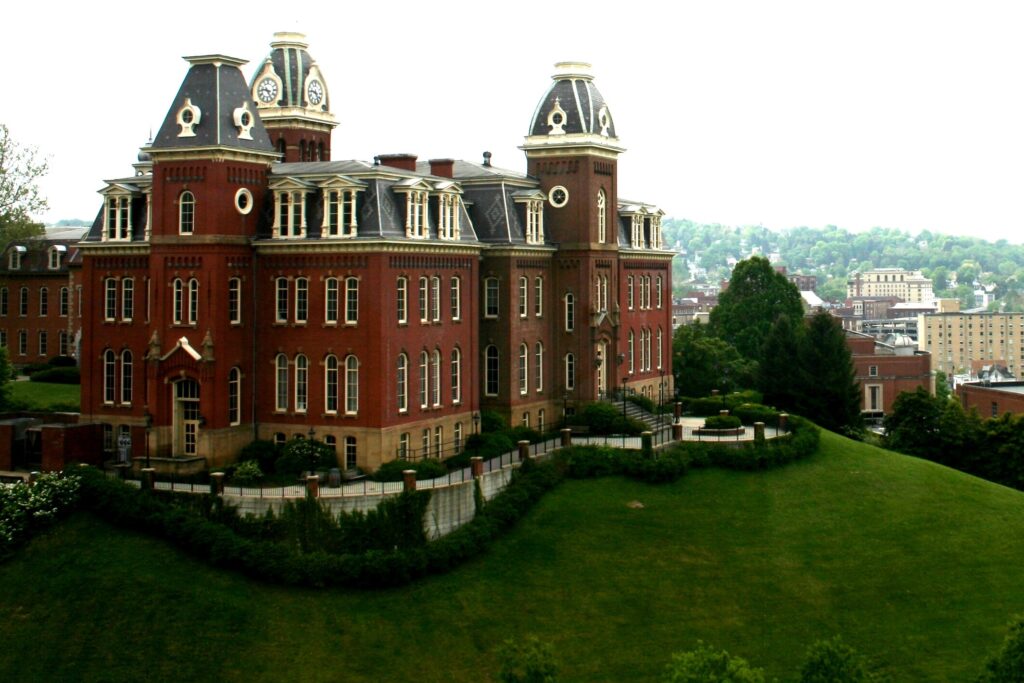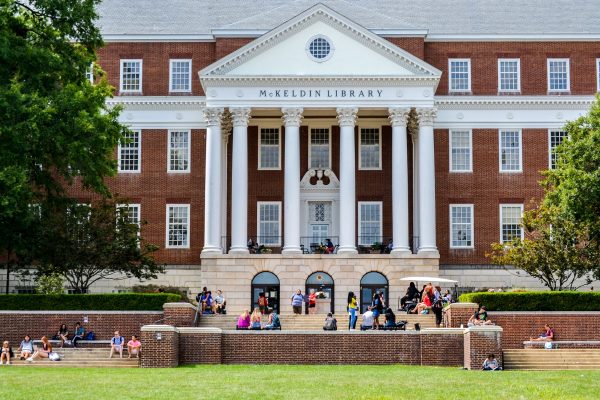Dear Members of the Board of Governors, West Virginians, and all Americans:
We write at a potentially cataclysmic moment for West Virginia University (WVU), where we are professors. As the flagship university and land-grant institution of one of the poorest states in the United States, our university has unmatched importance for the people of West Virginia. It also offers a clear example of the significance of a public university: what it has been, what it risks devolving into, and what it still can become.
We’re speaking out—despite pressure from the WVU administration to remain silent—because we’re impelled by our responsibility as employees and stewards of this public university to safeguard its integrity and its future. With this letter, we join our colleagues’ decisive call for the Board to freeze the current proposal to shutter programs and lay off faculty and staff. We call upon Board members to avoid negligence in your supervision of this university. We also write out of concern that what happens at WVU this fall—whether these catastrophic cuts are frozen or forced through—will serve as a canary in the coal mine for the integrity and future of public education throughout the United States.
WVU’s current crisis has received significant national news coverage over the past few weeks. Faculty and staff heard vague rumors about financial problems in late 2022, but the deficit was publicly announced only in March 2023. The crisis is largely caused by financial mismanagement; the university is running a $45 million deficit after a decade of real estate boondoggles, administrative bloat, and declining state funding. Instruction costs have declined but the administration is responding to the budget deficit by proposing a mass layoff of around 170 faculty and an undeclared number of staff this fall on top of 135 layoffs over the summer. Many departments may be closed or gutted to the point of not being able to function. Academic support units are also suffering: the library was forced to reduce its operational budget by thirty percent and currently cannot purchase books. Not a single senior administrator—many making at least five to ten times what most faculty earn—is taking a pay cut.
In fact, academic work at the university began to be cut to the bone long before this year’s crisis. The English department has not had enough faculty to regularly offer a Shakespeare course. In the chemistry department, plastic tarps and plexiglass have been installed to protect expensive equipment from the leaky building in which they are housed—a building that has been in need of renovation since the 1990s. In the Eberly College of Arts and Sciences, WVU’s largest college, incoming professors have not been able to access their start-up funds—monies promised to them as part of their contracts. And since the pandemic began, many departments have been forced to function on a fraction of their normal operating budgets.
But the 2023 cuts go far beyond short-term frugality and will decimate WVU for decades to come. If the rest of these cuts go through, students will no longer be able to take even a single course in many world languages, including Russian, Arabic, French, German, and Italian; music courses, including piano performance and jazz; public administration; graduate-level math; arts programs, including ceramics, printmaking, and sculpture; parks, recreation, and tourism; or graduate-level study of higher education administration. Across almost all departments and programs, the variety and quality of courses on offer will decrease because faculty positions will be cut and class sizes increased. Our university risks being so hollowed out that students will not have the ability to do what is most enriching about college, and what defined so many of our own experiences: explore disciplines or take a class for the sake of curiosity, not solely as a means to a vocational end. WVU will be left a Potemkin university; a false front; a gutted shell.
West Virginians deserve a real university. The very idea of the common good has been lost in the discussions about WVU’s catastrophic cuts; the significance of a public university has been forgotten. But just what is a public university? A public university is neither the buildings on a campus nor the endowment nor its figureheads. The public university is quite simply its people: students, past, present, and future; staff who support the mission; workers who provide services; and us, the faculty. A public university is owned by the people of that state. Employees of a public university—like us—are public employees. We do not work for the president or provost of WVU. We do not even work for the Board of Governors. We work for the people of West Virginia.
People are the heart of the public university, and the public university is the heart of American democracy. The crucial role of public universities to democracy is why the most important battles in the modern history of our country—from the Black freedom struggle to antiwar organizing—have happened on the campuses of public universities. Now is no different; this is our crossroads.
In its 156-year history, WVU has undergone massive changes. Founded in 1867 through the Morrill Act, a piece of legislation that transferred stolen Indigenous lands to white settlers, WVU became one of many new colleges to enable non-elite white men to pursue degrees in agriculture, industry, and the liberal arts. The twentieth century saw the expansion of who the university served, as well as who it employed, when white women, Black men and women, international students, and working-class students—the sons and daughters of the state’s industrial workforce—gained access to higher learning. That project of racial and class equity is ongoing, nowhere near complete, and in peril. In the 1970s, on the heels of the expansion of the student body brought about by federal policy and social movements, access to state and federal funding began to decrease. Since then the cost of college has risen, and student loan debt has ballooned. Faculty governance has been consistently eroded, and the number, power, and pay scales of administrators have increased, a nationwide trend. Debates ensued about the purpose and meaning of higher education, especially in a poor state in need of economic development.
As historian Ronald L. Lewis documents in his history of WVU, the last thirty years have been dominated by two, often contradictory, developments: an emphasis on knowledge production that serves the people of the state and beyond, and the pressure to run more like a private business. At our present moment, this contradiction has grown into a full-blown crisis—and one not only about a budgetary issue, but about the meaning of public higher education across the United States.
How do our colleagues, students, and community members define the crisis? We hear them speak of lost careers, community, and opportunities. They lament the destruction of pathways of learning for future generations of West Virginians, whose lives are undoubtedly more capacious and interesting than we can foresee or fathom. They mourn the potential loss of programs that have enriched people’s lives at and beyond the university. Those programs slated for cuts—and the relationships on which they are founded, the legacies they contain—are too numerous to list here. They entail everything from the deeply human traditions of making ceramics, speaking languages, cooking food, and studying advanced math concepts, to programs that enrich our public life, like learning how to implement public policy and how to be stewards of our public parks and natural resources.
As a land-grant university, WVU is required by federal law to undertake research, teaching, and outreach that supports our state’s natural resources, including livestock management, animal and nutritional sciences, outdoor recreation and tourism, landscape architecture, environmental planning, horticulture, soil and water science, energy resources, and more. As a flagship university, we preserve, safeguard, and grow the intellectual life of this state. These two commitments are not at cross purposes. Resource management involves the liberal arts, because people—who must read, think, calculate, and communicate—make research-based decisions, using critical thinking, about how best to sustainably utilize our natural resources. And the intellectual life of the state is also a resource, one of our most extensive and beneficial. WVU’s twinned responsibilities as both a flagship and a land-grant university make it possible to train our state’s teachers, from early childhood through high school. West Virginia already has a teacher shortage of 1,700 educators; what will happen in future years without graduate math, world language, arts, music, and more?
In their depth and breadth, our research and teaching have incalculable downstream effects. Our classrooms, labs, and offices, our conversations, our writing, and our speaking contribute to the university’s mission to “advance education, healthcare and prosperity for all.” From increasing access to physical activity to tackling water pollution, from training our state’s future educators to teaching young people how to garden, from legal advocacy for disabled veterans to identifying new pharmaceutical possibilities through studying fungi, to recording Appalachia’s formal economic, activist, and folk histories, to publishing award-winning books that honor the voices of this place: this is WVU’s work. And West Virginians deserve to learn about ideas that reach well beyond our state—whether Aristotle’s logic, fashion design, or media studies—because everyone deserves a doorway to the whole world. WVU reaches people across our entire state in ways and to extents that no one can measure but that we can all value. The proposed cuts will cause irreparable harm to our state’s economic, cultural, and intellectual ecology.
University administrators say that it’s time to transform WVU into a more efficient university. We’re not opposed to change, but we strongly object to the process to date and we object to the reduction of education to cold market logic. WVU and its consultants have not consistently offered accurate numbers when identifying departments under review, but even if they had, can numbers ever measure the value of the thousands-year-old tradition of making ceramics? Of connecting with people in the past and future through the language of mathematics? Of fostering the effervescent feeling of solving a problem with one’s community, or communicating with people around the world?
Ultimately, we understand the public university as a space to nurture a democratizing vision of the present and the future that builds on our rich history. Faculty recognize that the public university is a space of shared decision making and robust community. Yesterday faculty convened a full assembly and passed a resolution of no confidence in both our leadership and this process by a landslide: 89 percent and 90 percent, respectively. Students, too, see WVU as their own institution and one they hold in trust for future students—and this was on full display during recent student protests. In this moment of crisis for the public university, we all see a moment of powerful opportunity: to recommit to the public university as a space of accessible, inclusive, and sustainable growth.
We thus call on the Board of Governors to engage in good faith and freeze this process, which has excluded most of WVU’s stakeholders from meaningful participation, is opposed by many students, faculty, staff, alumni, and community members, and has already caused severe damage. We—the people of WVU—have been sourcing, discussing, and analyzing data together; we have been cooperating, proposing, and voting together; we have been protesting, speaking, and writing together. We now ask the Board to commit to working with students, faculty, and staff to develop a new model for the future of West Virginia University based on democratic principles of true shared governance. At this point, neither President E. Gordon Gee nor the process of so-called “academic transformation” serves the best interests of the university or the state.
There’s still time to recognize our duty to the West Virginia public that employs us and whom we serve. What’s more, we can provide an inspirational model for other university administrations: we can commit to preserving and enhancing access to the university as a public good in the fullest sense. We stand ready to do this work for the people of West Virginia today and tomorrow—work that can and should be done together.
Signed,
Rose Casey
Assistant Professor of English
Jessica Wilkerson
Associate Professor of History
Johanna Winant
Assistant Professor of English
Boston Review is nonprofit, paywall-free, and reader-funded. To support work like this, please donate here.







